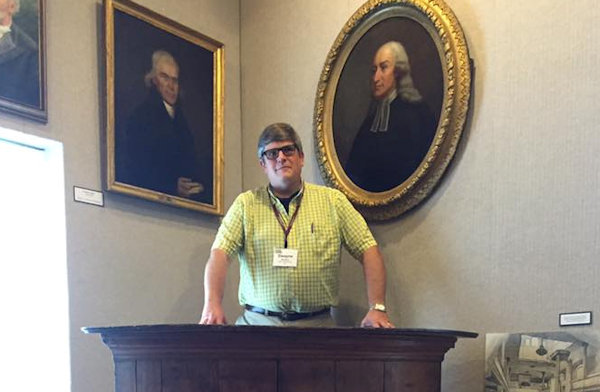Kalamazoo District Superintendent chose to be United Methodist. Here’s why.
REV. DWAYNE BAGLEY
Superintendent, Kalamazoo District
 Every year, after navigating my weaving way through another Annual Conference session, I wonder anew why I am United Methodist. I did not inherit this faith tradition. I did not grow up in the church. So, for me, being United Methodist was and is a choice. There were some specific reasons I embraced the United Methodist way of being Christian.
Every year, after navigating my weaving way through another Annual Conference session, I wonder anew why I am United Methodist. I did not inherit this faith tradition. I did not grow up in the church. So, for me, being United Methodist was and is a choice. There were some specific reasons I embraced the United Methodist way of being Christian.
A few years ago, I wrote a series of articles to share those reasons with the congregation I was serving. I thought some of you might be interested in those reasons as well. So, in my newsletter articles these next few weeks, I will share some of those reasons. I’d be glad to engage anybody in further conversation around these key ideas. Feel free to contact me and we’ll find some time to sit and reason together. Although the list that begins below is numbered, I’m presenting my reasons for why I am United Methodist in no particular order.
1. Religion should be a matter of head and heart. Since the beginning, people called Methodist have used the best of the resources available from scripture, reason, tradition and personal experience in the practice of their faith. These elements unpack like this:
a) We take a serious approach to the witness of scripture rather than a literal approach. We consider what the message of the Bible said to the people who originally heard it as we discern how it still speaks today to people living in very different circumstances than theirs. As we do that, however, we seek to remain open to how the Holy Spirit speaks to our spirit through the witness of scripture.
b) In addition, being United Methodist doesn’t require a person to check their brain at the door. We use all our God-given abilities, including powers of reason, to discern what is necessary, right and good. We believe that God wants thinking Christians, not mindless sheep.
c) People called Methodist also value being part of that “great cloud of witnesses” which is the most vital part of the tradition of the Christian Church. We believe the faithful example and practices of our forerunners in the faith has much to teach us about how we might be better disciples. In lifting up tradition we make an important distinction between tradition and traditionalism. Traditionalism is a form of idolatry that preserves the practices of the past at the expense, or perhaps even exclusion, of the Church’s mission in the present age. Tradition is practicing the essentials of our ancient faith in a way that engages people today with the vital message of the Gospel. In all we do we strive to be on the living edge of Christian faith.
d) Lastly, we believe God still speaks to people today. The Methodist Movement began with the experience of one individual, John Wesley, who had a personal encounter with Jesus Christ that left his heart on fire for God. For years one of the questions asked of Methodist preachers was whether they had experience of Christ as their Savior. When Methodists gathered in small groups, they inquired of one another, “How is it with your soul?” as a way of inviting each person to share their present experience of God. We believe that such experiences make all the difference. From generation to generation the people called Methodist have believed that that an individual encounter with God in Jesus Christ has the power to transform a person’s life. The experience opens them to new understandings of the Bible, offers new ideas about their place in God’s creation, and prompts them to consider new ways of practicing their faith in the world.
Next week, I’ll write about why what United Methodists believe about salvation makes a huge difference in how we try to be Christian and how being in Christ influences us to engage the world. Until then, may the best gifts of the Bible’s witness, reason’s guiding light, the living edge of Christian tradition and a personal experience of God’s saving grace direct your path and satisfy your soul.
Last Updated on June 19, 2017

